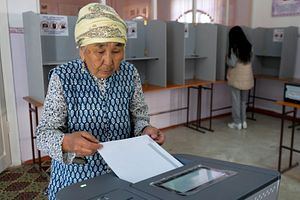BISHKEK — Kyrgyzstan held its first competitive presidential election since its 1991 independence on Sunday—unique in a young republic which had only changed government by revolution until now. But to many voters, the election’s fairness is up for debate.
Kyrgyz voters are well aware of the gravity of the event—their recent competitive parliamentary elections set their country apart from neighbors with long-serving rulers and notoriously unresponsive systems of governance. But though voters here are proud of their progress as a democracy, difficulties with this presidential race have reminded them that administrative obstacles still stand in the way of accountable government.
The nominee from the incumbent Social Democratic Party of Kyrgyzstan was Sooronbai Jeenbekov, who served as prime minister before stepping down from his post for his presidential run. While official results are still being finalized, he appears to have won the vote with well over 50 percent, leaving second-place candidate Omurbek Babanov with just 33 percent, and the other nine candidates with less than 12 percent of the electorate between them. The election itself proceeded peacefully in most localities except Osh, the second-largest city in the country, and Jeenbekov’s home region. Here, it was marred by allegations of ballot destruction, intimidation, and violence towards reporters.
Most citizens report that they were able to vote quickly and without trouble. Kyrgyzstan implemented a biometric verification system, (first used in the 2015 parliamentary election) aimed to engender faith in the integrity of voting stations themselves, in most places. Though many voters exited stations praising the reliability and easy use of the system, others left frustrated, remarking on social media that they were “completely lost by the system.” The Kyrgyz embassy in Moscow notably faced some protests after immigrant Kyrgyz workers found their registrations weren’t recorded in the system when they arrived to vote.
Voters in Bishkek seemed less concerned with the process itself than with the campaign — many complained about an especially negative campaign season, with coverage weighted heavily in favor of Jeenbekov. Gulnara, a retiree in the southern part of Bishkek, who was in and out of the voting booth in less than ten minutes said that to her, efficiency was hardly a concern compared to the administrative pressure being levied against the field of candidates. “[Current President] Atambayev misused his position,” she objected, “he spent his energy on black PR (mudslinging), which isn’t fair. He uses his free time on television to make sure we vote for his friend, Jeenbekov.”
OSCE observers concurred with these voters’ concerns, noting that while technical aspects were “well-administered,” and that candidates could campaign freely, public resources were misused in the run-up to the election. They also highlighted several significant issues with vote counts — including vote-buying, which was strongly discouraged by announcements posted outside every polling site.
Jeenbekov supporters, in contrast, have been tentatively celebrating. To them, the conclusion of the vote means the passage of a successful democratic election, part of a steady progression since the last transfer of power following Kyrgyzstan’s 2010 revolution, which toppled an authoritarian government that failed to control home energy costs, and instituted a new constitution. In their view, Jeenbekov represented a pragmatic view of politics thanks to his experience with the current administration. In contrast, Babanov, who gained prominence as a real estate developer responsible for highly visible projects like the brand-new Asia Mall, was only popular because “his supporters thought he would share his wealth with them,” according to a student who voted for Jeenbekov. Other Jeenbekov voters did not go so far, but cited stability and a lack of ostentatiousness as their reasons for supporting him.
President Atambayev had a different criticism of Babanov, citing a meeting three weeks ago with Kazakh officials as evidence that Kyrgyzstan’s northern neighbor was attempting to influence the election through Jeenbekov’s primary challenger. Kazakhstan responded aggressively to the charge, throttling border crossings between the two countries just days before the vote. Gulnara placed the blame squarely on Atambayev: “most candidates now are the same on international relations. But our current president could have been more diplomatic with these accusations.” As to whether he was right to challenge Kazakhstan at all—“Who knows? If Kazakhstan interfered with our election, I would have no idea. They don’t appear on my television every night. Atambayev does,” she said in front of nodding neighbors.
Despite varying frustrations with the election, few would disagree that it marks an important shift away from the turmoil surrounding the 2010 revolution. Some citizens before the last weeks of the campaign predicted that unrest was even more likely to occur now, as recent internal migration flows have meant ethnic and socioeconomic groups are clustering closer together, possibly magnifying the tensions that were laid bare during the unrest seven years ago. Despite these demographic shifts, violence has not followed this election.
For his part, Babanov accepted the results of the race on the day after voting concluded, discouraging his supporters from publicly protesting the results. His message has been that, over time, the future political outcomes of a fully realized constitutional republic would decide who was in the right. Though that message may ultimately resonate with his supporters, many saw his campaign as a chance to focus on fixing remaining gaps in development.
“Look at this,” said Aichurok, one of Gulnara’s neighbors, gesturing towards a pile of asphalt on a sidewalk, “we don’t have to have things like this. The current government did some good things, but to keep improving, we need leaders with new ideas. But now, this is our life.”
Abhi Goyal is a Fulbright researcher in Bishkek, Kyrgyzstan. He can be found on twitter at @goyal_abhi. The views expressed here do not represent the Fulbright Program, the U.S. State Department or any of their partner organizations

































